- Home
- Martin Amis
Heavy Water and Other Stories
Heavy Water and Other Stories Read online
Heavy Water and Other Stories
Martin Amis
“Martin Amis is a stone-solid genius… a dazzling star of wit and insight.”
—The Wall Street Journal
In this wickedly delightful collection of stories, Martin Amis once again demonstrates why he is a modern master of the form. In “Career Move,” screenwriters struggle for their art, while poets are the darlings of Hollywood. In “Straight Fiction,” the love that dare not speak its name calls out to the hero when he encounters a forbidden object of desire—the opposite sex. And in “State of England,” Mal, a former “minder to the superstars,” discovers how to live in a country where “class and race and gender were supposedly gone.”
In Heavy Water and Other Stories, Amis astonishes us with the vast range of his talent, establishing that he is one of the most versatile and gifted writers of his generation.
Martin Amis
HEAVY WATER
and Other Stories
To Delilah and Fernanda
CAREER MOVE
WHEN ALISTAIR FINISHED his new screenplay, Offensive from Quasar 13, he submitted it to the LM, and waited. Over the past year, he had had more than a dozen screenplays rejected by the Little Magazine. On the other hand, his most recent submission, a batch of five, had been returned not with the standard rejection slip but with a handwritten note from the screenplay editor, Hugh Sixsmith. The note said:
I was really rather taken with two or three of these, and seriously tempted by Hotwire, which I thought close to being fully achieved. Do please go on sending me your stuff.
Hugh Sixsmith was himself a screenplay writer of considerable, though uncertain, reputation. His note of encouragement was encouraging. It made Alistair brave.
Boldly he prepared Offensive from Quasar 13 for submission. He justified the pages of the typescript with fondly lingering fingertips. Alistair did not address the envelope to the Screenplay Editor. No. He addressed it to Mr. Hugh Sixsmith. Nor, for once, did he enclose his curriculum vitae, which he now contemplated with some discomfort. It told, in a pitiless staccato, of the screenplays he had published in various laptop broadsheets and comically obscure pamphlets; it even told of screenplays published in his university magazine. The truly disgraceful bit came at the end, where it said “Rights Offered: First British Serial only.”
Alistair spent a long time on the covering note to Sixsmith—almost as long as he had spent on Offensive from Quasar 13. The note got shorter and shorter the more he worked on it. At last he was satisfied. There in the dawn he grasped the envelope and ran his tongue across its darkly luminous cuff.
That Friday, on his way to work, and suddenly feeling completely hopeless, Alistair surrendered his parcel to the sub post office in Calchalk Street, off the Euston Road. Deliberately—very deliberately—he had enclosed no stamped, addressed envelope. The accompanying letter, in its entirety, read as follows: “Any use? If not—w.p.b.”
“W.p.b.” stood, of course, for “wastepaper basket”—a receptacle that loomed forbiddingly large in the life of a practicing screenplay writer. With a hand on his brow, Alistair sidled his way out of there—past the birthday cards, the tensed pensioners, the envelopes, and the balls of string.
When Luke finished the new poem—entitled, simply, “Sonnet”—he photocopied the printout and faxed it to his agent. Ninety minutes later he returned from the gym downstairs and prepared his special fruit juice while the answering machine told him, among many other things, to get back to Mike. Reaching for an extra lime, Luke touched the preselect for Talent International.
“Ah. Luke,” said Mike. “It’s moving. We’ve already had a response.”
“Yeah, how come? It’s four in the morning where he is.”
“No, it’s eight in the evening where he is. He’s in Australia. Developing a poem with Peter Barry.”
Luke didn’t want to hear about Peter Barry. He bent and tugged off his tank top. Walls and windows maintained a respectful distance—the room was a broad seam of sun haze and river light. Luke sipped his juice: its extreme astringency caused him to lift both elbows and give a single, embittered nod. He said, “What did he think?”
“Joe? He did backflips. It’s ‘Tell Luke I’m blown away by the new poem. I just know that “Sonnet” is really going to happen.’”
Luke took this coolly. He wasn’t at all old but he had been in poetry long enough to take these things coolly. He turned. Suki, who had been shopping, was now letting herself into the apartment, not without difficulty. She was indeed cruelly encumbered. Luke said, “You haven’t talked numbers yet. I mean like a ballpark figure.”
Mike said, “We understand each other. Joe knows about Monad’s interest. And Tim at TCT.”
“Good,” said Luke. Suki was wandering slenderly toward him, shedding various purchases as she approached—creels and caskets, shining satchels.
“They’ll want you to go out there at least twice,” said Mike. “Initially to discuss… They can’t get over it that you don’t live there.”
Luke could tell that Suki had spent much more than she intended. He could tell by the quality of patience in her sigh as she began to lick the sweat from his shoulderblades. He said, “Come on, Mike. They know I hate all that L.A. crap.”
On his way to work that Monday Alistair sat slumped in his bus seat, limp with ambition and neglect. One fantasy was proving especially obdurate: as he entered his office, the telephone on his desk would actually be bouncing on its console—Hugh Sixsmith, from the Little Magazine, his voice urgent but grave, with the news that he was going to rush Alistair’s screenplay into the very next issue. (To be frank, Alistair had had the same fantasy the previous Friday, at which time, presumably, Offensive from Quasar 13 was still being booted round the floor of the sub post office.) His girlfriend, Hazel, had come down from Leeds for the weekend. They were so small, he and Hazel, that they could share his single bed quite comfortably—could sprawl and stretch without constraint. On the Saturday evening, they attended a screenplay reading at a bookshop on Camden High Street. Alistair hoped to impress Hazel with his growing ease in this milieu (and managed to exchange wary leers with a few shambling, half-familiar figures—fellow screenplay writers, seekers, knowers). But these days Hazel seemed sufficiently impressed by him anyway, whatever he did. Alistair lay there the next morning (her turn to make tea), wondering about this business of being impressed. Hazel had impressed him mightily, seven years ago, in bed: by not getting out of it when he got into it. The office telephone rang many times that Monday, but none of the callers had anything to say about Offensive from Quasar 13. Alistair sold advertising space for an agricultural newsletter, so his callers wanted to talk about creosote admixes and offal reprocessors.
He heard nothing for four months. This would normally have been a fairly good sign. It meant, or it might mean, that your screenplay was receiving serious, even agonized, consideration. It was better than having your screenplay flopping back on the mat by return post. On the other hand, Hugh Sixsmith might have responded to the spirit and the letter of Alistair’s accompanying note and dropped Offensive from Quasar 13 into his wastepaper basket within minutes of its arrival: four months ago. Rereading his fading carbon of the screenplay, Alistair now cursed his own (highly calibrated) insouciance. He shouldn’t have said. “Any use? If not—w.p.b.” He should have said, “Any use? If not—s.a.e.”! Every morning he went down the three flights of stairs—the mail was there to be shuffled and dealt. And every fourth Friday, or thereabouts, he still wrenched open his LM, in case Sixsmith had run the screenplay without letting him know. As a surprise.
“Dear Mr. Sixsmith,” thought Alistair as he rode the train to Leeds. “
I am thinking of placing the screenplay I sent you elsewhere. I trust that… I thought it only fair to…” Alistair retracted his feet to accommodate another passenger. “My dear Mr. Sixsmith: In response to an inquiry from… In response to a most generous inquiry, I am putting together a selection of my screenplays for…” Alistair tipped his head back and stared at the smeared window. “For Mudlark Books. It seems that the Ostler Press is also interested. This involves me in some paperwork, which, however tedious… For the record… Matters would be considerably eased… Of course if you…”
Luke sat on a Bauhaus love seat in Club World at Heathrow, drinking Evian and availing himself of a complimentary fax machine—clearing up the initial paperwork on the poem with Mike.
Everyone in Club World looked hushed and grateful to be there, but not Luke, who looked exhaustively displeased. He was flying first class to LAX, where he would be met by a uniformed chauffeur who would convey him by limousine or courtesy car to the Pinnacle Trumont on the Avenue of the Stars. First class was no big thing. In poetry, first class was something you didn’t need to think about. It wasn’t discussed. It was statutory. First class was just business as usual.
Luke was tense: under pressure. A lot—maybe too much—was riding on “Sonnet.” If “Sonnet” didn’t happen, he would soon be able to afford neither his apartment nor his girlfriend. He would recover from Suki before very long. But he would never recover from not being able to afford her, or his apartment. If you wanted the truth, his deal on “Sonnet” was not that great. Luke was furious with Mike except about the new merchandizing clause (potential accessories on the poem—like toys or T-shirts) and the improved cut he got on tertiaries and sequels. Then there was Joe.
Joe calls, and he’s like, “We really think ‘Sonnet’’s going to work, Luke. Jeff thinks so, too. Jeff’s just come in. Jeff? It’s Luke. Do you want to say something to him? Luke. Luke, Jeff’s coming over. He wants to say something about ‘Sonnet.’”
“Luke?” said Jeff. “Jeff. Luke? You’re a very talented writer. It’s great to be working on ‘Sonnet’ with you. Here’s Joe.”
“That was Jeff,” said Joe. “He’s crazy about ‘Sonnet.’”
“So what are we going to be talking about?” said Luke. “Roughly.”
“On ‘Sonnet’? Well, the only thing we have a problem on ‘Sonnet’ with, Luke, so far as I can see, anyway, and I know Jeff agrees with me on this—right, Jeff?—and so does Jim, incidentally, Luke,” said Joe, “is the form.”
Luke hesitated. Then he said, “You mean the form ‘Sonnet’ ‘s written in.’”
“Yes, that’s right, Luke. The sonnet form.”
Luke waited for the last last call and was then guided, with much unreturned civility, into the plane’s nose.
“Dear Mr. Sixsmith,” wrote Alistair,
Going through my files the other day, I vaguely remembered sending you a little effort called Offensive from Quasar 13—just over seven months ago, it must have been. Am I right in assuming that you have no use for it? I might bother you with another one (or two!) that I have completed since then. I hope you are well. Thank you so much for your encouragement in the past.
Need I say how much I admire your own work? The austerity, the depth. When, may I ask, can we expect another “slim vol.”?
He sadly posted this letter on a wet Sunday afternoon in Leeds. He hoped that the postmark might testify to his mobility and grit.
Yet, really, he felt much steadier now. There had been a recent period of about five weeks during which, Alistair came to realize, he had gone clinically insane. That letter to Sixsmith was but one of the many dozens he had penned. He had also taken to haunting the Holborn offices of the Little Magazine: for hours he sat crouched in the coffee bars and sandwich nooks opposite, with the unsettled intention of springing out at Sixsmith—if he ever saw him, which he never did. Alistair began to wonder whether Sixsmith actually existed. Was he, perhaps, an actor, a ghost, a shrewd fiction? Alistair telephoned the LM from selected phone booths. Various people answered, and no one knew where anyone was, and only three or four times was Alistair successfully connected to the apparently permanent coughing fit that crackled away at the other end of Sixsmith’s extension. Then he hung up. He couldn’t sleep, or he thought he couldn’t, for Hazel said that all night long he whimpered and gnashed.
Alistair waited for nearly two months. Then he sent in three more screenplays. One was about a Machine hit man who emerges from early retirement when his wife is slain by a serial murderer. Another dealt with the infiltration by the three Gorgons of an escort agency in present-day New York. The third was a heavy-metal musical set on the Isle of Skye. He enclosed a stamped, addressed envelope the size of a small knapsack.
Winter was unusually mild.
“May I get you something to drink before your meal? A cappuccino? A mineral water? A glass of sauvignon blanc?”
“Double decaf espresso,” said Luke. “Thanks.”
“You’re more than welcome.”
“Hey,” said Luke when everyone had ordered. “I’m not just welcome anymore. I’m more than welcome.”
The others smiled patiently. Such remarks were the downside of the classy fact that Luke, despite his appearance and his accent, was English. There they all sat on the terrace at Bubo’s: Joe, Jeff, Jim.
Luke said, “How did ‘Eclogue by a Five-Barred Gate’ do?”
Joe said, “Domestically?” He looked at Jim, at Jeff. “Like—fifteen?”
Luke said, “And worldwide?”
“It isn’t going worldwide.”
“How about ‘Black Rook in Rainy Weather’?” asked Luke.
Joe shook his head. “It didn’t even do what ‘Sheep in Fog’ did.”
“It’s all remakes,” said Jim. “Period shit.”
“How about ‘Bog Oak’?”
“‘Bog Oak’? Ooh, maybe twenty-five?”
Luke said sourly, “I hear nice things about ‘The Old Botanical Gardens.’”
They talked about other Christmas flops and bombs, delaying for as long as they could any mention of TCT’s “ ’Tis he whose yester-evening’s high disdain,” which had cost practically nothing to make and had already done a hundred and twenty million in its first three weeks.
“What happened?” Luke eventually asked. “Jesus, what was the publicity budget?”
“On ‘’Tis?’” said Joe. “Nothing. Two, three.”
They all shook their heads. Jim was philosophical. “That’s poetry,” he said.
“There aren’t any other sonnets being made, are there?” said Luke.
Jeff said, “Binary is in post-production with a sonnet. ‘Composed at—Castle.’ More period shit.”
Their soups and salads arrived. Luke thought that it was probably a mistake, at this stage, to go on about sonnets. After a while he said, “How did ‘For Sophonisba Anguisciola’ do?”
Joe said, “‘For Sophonisba Anguisciola’? Don’t talk to me about ‘For Sophonisba Anguisciola.’”
It was late at night and Alistair was in his room working on a screenplay about a high-IQ homeless black man who is transformed into a white female junk-bond dealer by a South Moluccan terrorist witch doctor. Suddenly he shoved this aside with a groan, snatched up a clean sheet of paper, and wrote:
Dear Mr. Sixsmith,
It is now well over a year since I sent you Offensive from Quasar 13. Not content with that dereliction, you have allowed five months to pass without responding to three more recent submissions. A prompt reply I would have deemed common decency, you being a fellow screenplay writer, though I must say I have never cared for your work, finding it, at once, both florid and superficial. (I read Matthew Sura’s piece last month and I thought he got you bang to rights.)
Please return the more recent screenplays, namely Decimator, Medusa Takes Manhattan and Valley of the Stratocasters, immediately.
He signed it and sealed it. He stalked out and posted it. On his return he haughtily threw of
f his drenched clothes. The single bed felt enormous, like an orgiast’s fourposter. He curled up tight and slept better than he had done all year.
So it was a quietly defiant Alistair who the next morning came plodding down the stairs and glanced at the splayed mail on the shelf as he headed for the door. He recognized the envelope as a lover would. He bent low as he opened it.
Do please forgive this very tardy reply. Profound apologies. But allow me to move straight on to a verdict on your work. I won’t bore you with all my personal and professional distractions.
Bore me? thought Alistair, as his hand sought his heart.
I think I can at once give the assurance that your screenplays are unusually promising. No: that promise has already been honored. They have both feeling and burnish.
I will content myself, for now, by taking Offensive from Quasar 13. (Allow me to muse a little longer on Decimator.)
I have one or two very minor emendations to suggest. Why not telephone me here to arrange a chat?
Thank you for your generous remarks about my own work. Increasingly I find that this kind of exchange—this candor, this reciprocity—is one of the things that keep me trundling along. Your words helped sustain my defenses in the aftermath of Matthew Sura’s vicious and slovenly attack, from which, I fear, I am still rather reeling. Take excellent care.
“Go with the lyric,” said Jim.
“Or how about a ballad?” said Jeff.
Jack was swayable. “Ballads are big,” he allowed.
It seemed to Luke, toward the end of the second day, that he was winning the sonnet battle. The clue lay in the flavor of Joe’s taciturnity: torpid but unmorose.
“Let’s face it,” said Jeff. “Sonnets are essentially hieratic. They’re strictly period. They answer to a formalized consciousness. Today, we’re talking consciousnesses that are in search of form.”

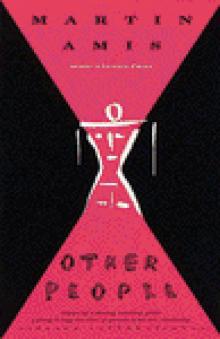 Other People
Other People The Zone of Interest
The Zone of Interest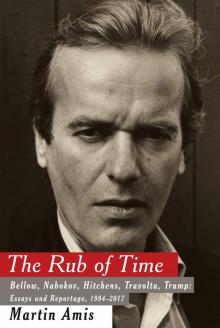 The Rub of Time: Bellow, Nabokov, Hitchens, Travolta, Trump
The Rub of Time: Bellow, Nabokov, Hitchens, Travolta, Trump Koba the Dread
Koba the Dread Success
Success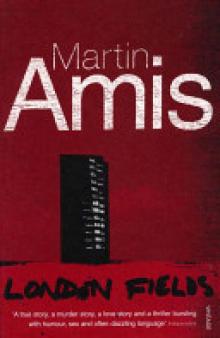 London Fields
London Fields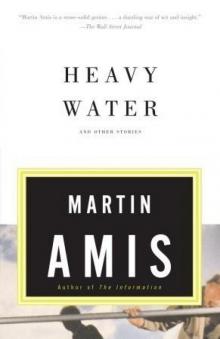 Heavy Water: And Other Stories
Heavy Water: And Other Stories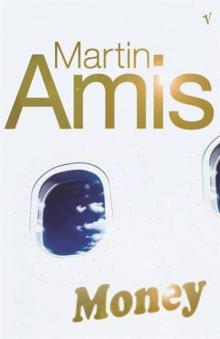 Money
Money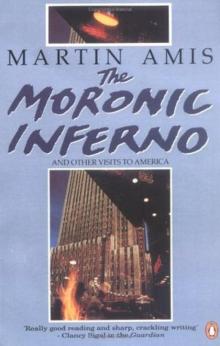 The Moronic Inferno and Other Visits to America
The Moronic Inferno and Other Visits to America Yellow Dog
Yellow Dog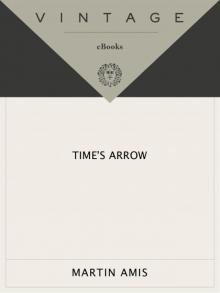 Time's Arrow
Time's Arrow Experience: A Memoir
Experience: A Memoir Einstein's Monsters
Einstein's Monsters The Pregnant Widow
The Pregnant Widow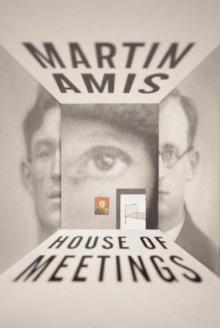 House of Meetings
House of Meetings The Information
The Information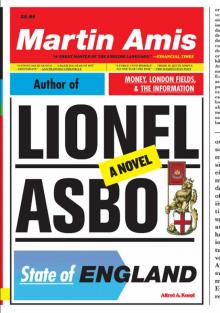 Lionel Asbo: State of England
Lionel Asbo: State of England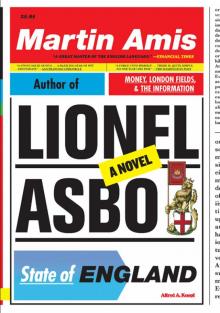 Lionel Asbo
Lionel Asbo Heavy Water and Other Stories
Heavy Water and Other Stories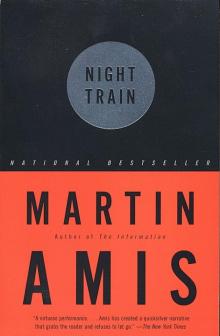 Night Train
Night Train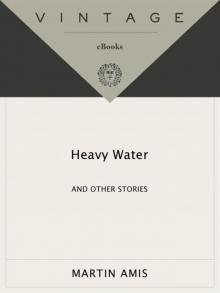 Heavy Water
Heavy Water The War Against Cliche: Essays and Reviews 1971-2000 (Vintage International)
The War Against Cliche: Essays and Reviews 1971-2000 (Vintage International)